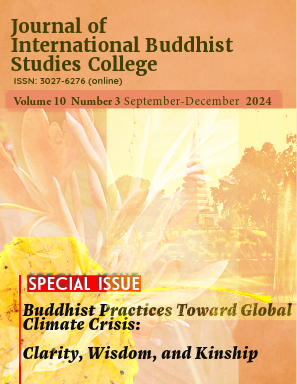Buddhist Ways to Manage Mental Suffering With Special Reference to Girimānanda Sutta
Main Article Content
Abstract
This article is for alleviating mental suffering, with a specialized focus on the Girimānanda Sutta. By examining the profound experiences of Venerable Girimānanda, who endured severe illness and mental distress, the study elucidates practical approaches rooted in the Buddha’s teachings that offer pathways to understanding and mitigating psychological suffering. Integrating perspectives from Theravada Buddhism and contemporary psychology, the investigation highlights the concept of saṅkhāra-dukkhaṭā, emphasizing the intrinsic link between mental formations and suffering as articulated in the sutta. Contrary to the predominant reliance on medical and psychological interventions in modern contexts, this study underscores the importance of comprehending the fundamental nature of suffering through a Buddhist lens. It advocates for the application of transformative practices such as mindfulness, meditation, ethical conduct, and the cultivation of insight, which are essential components of the Buddha’s path to mental well-being. By conducting a detailed exegesis of the Girimānanda Sutta, the research identifies actionable methods that not only address immediate distress but also foster long-term resilience and psychological equilibrium.
The findings demonstrate the enduring relevance of ancient Buddhist teachings in addressing the emotional and mental health challenges prevalent in today’s society. In an era marked by increasing societal pressures and a surge in mental health concerns, the study highlights how the timeless principles outlined in the Girimānanda Sutta can provide effective strategies for achieving emotional balance and inner peace. These Buddhist practices offer a complementary framework to contemporary mental health approaches, presenting holistic solutions that integrate spiritual wisdom with psychological well-being. Furthermore, the research emphasizes the applicability of the Girimānanda Sutta’s teachings in contemporary settings, illustrating how these ancient strategies can be adapted to modern therapeutic practices. By bridging traditional Buddhist philosophy with current mental health discourse, the study provides a comprehensive perspective on managing mental suffering, advocating for an integrated approach that leverages both spiritual and scientific insights.
In conclusion, this study offers a novel perspective on the intersection of Buddhism and mental health, demonstrating how the Girimānanda Sutta’s teachings can inform and enhance contemporary efforts to manage mental suffering. It underscores the potential of Buddhist principles to contribute to sustainable mental well-being, advocating for their incorporation into modern practices aimed at fostering emotional resilience and inner tranquility.
Article Details
The Journal of TCI is licensed under a Creative Commons Attribution-NonCommercial-NoDerivatives 4.0 International (CC BY-NC-ND 4.0) licence unless otherwise stated. Please read our Policies page for more information on Open Access, copyright and permissions.
References
American Psychiatric Association, D. S. M. T. F., & American Psychiatric Association, D. S. (2013). Diagnostic and statistical manual of mental disorders: DSM-5 (Vol. 5, No. 5). American Psychiatric Association.
American Psychological Association. (2020). Publication Manual of the American Psychological Association (7th ed.). American Psychological Association, 428.
American Psychological Association. (2022). Understanding psychology. https://www.apa.org
Beutler, L. E. (2021). Principles of therapeutic change that work. Oxford University Press.
Bhikkhu Bodhi. (1995). The Long Discourses of the Buddha. (tr). Wisdom Publications.
Bhikkhu Bodhi. (2000). The Connected Discourses of the Buddha, A Translation of the Samyutta Nikāya. Wisdom Publications.
Bien, T. (2006). Mindful Therapy: A Guide for Therapists and Helping Professionals. Wisdom Publications.
Conze, E. (2003). Buddhism: Its essence and development. Courier Corporation.
Dhammānanda, K. S. (1989). How to Live Without Fear & Worry. Buddhist Friedman, J. M., Schnurr, P. P., & Keane M. T. (Eds.). (2021). Handbook of PTSD: Science and Practice. The Guilford Press.
Gunaratana, H. (2014). Meditation on perception: Ten healing practices to cultivate mindfulness. Simon and Schuster.
Hodge, R. (2015). Meditation on Perception. https://www.whitenallmeditation.rg/wp-loads/Meditation on perception.
Kabat-Zinn, J. (2015). Mindfulness for beginners: Reclaiming the present moment—and your life. Hachette Books.
Ledi Sayadaw. (2012). Paramatthadīpanī. Ledīdīpanī Organization Group. Manjushridharma center. Missionary Society.
Mangalam, S. & Deleks, T. (2020). Impermanence, the Essence of Meditation. Tharchin. T. (Tr.). https://manjushridharmacenter.org/rinpoches-wisdom/impermanence-the-essence-of-meditation/
Myers, D. G. (2023). Psychology (13th ed.). Worth Publishers.
Ñānamoli Bhikkhu (tr.). (2006). Ten Contemplations with the commentary from the Sāratthasamuccaya. Buddhist Publication Society.
Nandamālābhivansa, A. (2016). A special devotional for the sick. Aung Zambu Publication.
Nandamālībhivamsa, A. (2010). The Part to Happiness. Center for Buddhist Studies (CBS).
Norcross, J. C. (2011). Psychotherapy Relationships that Work: Evidence-Based Responsiveness. Oxford University Press.
Norcross, J. C., & Wampold, B. E. (2018). Evidence-based therapy relationships: Research conclusions and clinical practices. In J. C. Norcross (Ed.), Psychotherapy relationships that work (3rd ed., pp. 3-26). Oxford University Press.
Payutto, B. P. (2017). Buddhadhamma: The laws of nature and their benefits to life. Buddhadhamma Foundation.
Sternberg, R. J., & Grigorenko, E. L. (2019). The Cambridge handbook of intelligence. Cambridge University Press.


